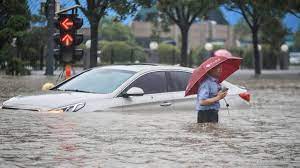At the COP27 climate summit hosted by the U.N. in Egypt, delegates decided to have a discussion about whether wealthy nations ought to make up for the suffering of developing nations that are most vulnerable to climate change.
As world leaders gathered for international climate negotiations on Sunday, the World Meteorological Organization issued a gloomy warning that Earth’s warmer weather and rising sea levels are growing worse and doing so quicker than before.
The most recent State of the Global Climate report, according to United Nations Secretary-General Antonio Guterres, “is a record of climate calamity.” “We must take ambitious, credible climate action in response to the planet’s distress warning.”
The United Nations weather office stated in its yearly state of the climate report that since January 2020, sea level rise has increased at a faster rate than it did in the prior decade, which was double that of the 1990s. Sea levels have risen at a rate of 5 millimeters a year (.2 inches) since the decade began, compared to 2.1 millimeters (.08 inches) in the 1990s.
The WMO reported that the past eight years had been the warmest on record. While the report didn’t make any new discoveries, it was a gathering of recent weather patterns, statistics, and implications in one location.
We’ve lost the game of ice melting and sea level rise, according to WMO chief Petteri Taalas to The Associated Press. “So yet, there have been no promising signs.”
A rare three-year La Nia weather phenomenon, according to him, is the sole explanation for why the world hasn’t recently smashed annual temperature records.
In comparison to how climate change has affected individuals in extreme weather, data on sea level and average temperatures are meaningless. A devastating four-year drought in East Africa has left more than 18 million people hungry, the Yangtze River dried to its lowest level in August, and record heatwaves have scorched people in Europe and China. These events are all highlighted in the report, along with the summer’s incredible flood in Pakistan that killed more than 1,700 people and forced 7.9 million people to flee their homes.
Climate scientist Jennifer Francis of the Woodwell Climate Research Center in Cape Cod, who wasn’t involved in the research, said that it “reads like a lab report for a dangerously ill patient, but in this instance the patient is Earth.”
The research stated that levels of heat-trapping carbon dioxide, methane, and nitrous oxide all hit record highs, with powerful methane rising at a record rate.
That entails more than just rising land temperatures. The report stated that ice, including the glaciers throughout the planet and the ice sheet covering Greenland is rapidly melting. When all types of ice are taken into account, Greenland has lost ice for the 26th year in a row. Between 2001 and 2022, the amount of snow on Swiss glaciers was reduced by more than one-third.
However, the ocean receives 90% of the heat that is stored on Earth, and the upper 2000 meters (6561 feet) of the ocean are warming up more quickly. According to the report, global warming has accelerated 67% during the past 15 years compared to 1971.
According to the paper, the temperature of the oceans “will continue to warm in the future, a development which is irreversible on centennial to millennial time scales.”
The report didn’t surprise outside experts, who claimed that no one should be.
The time has come to act on what climate scientists have been warning about for decades. “If nothing is done, it will only get worse,” said Marshall Shepherd, a professor of meteorology at the University of Georgia. “Climate delays and discussing the effects of climate change in the future tense must stop, it is now in the present.”


















